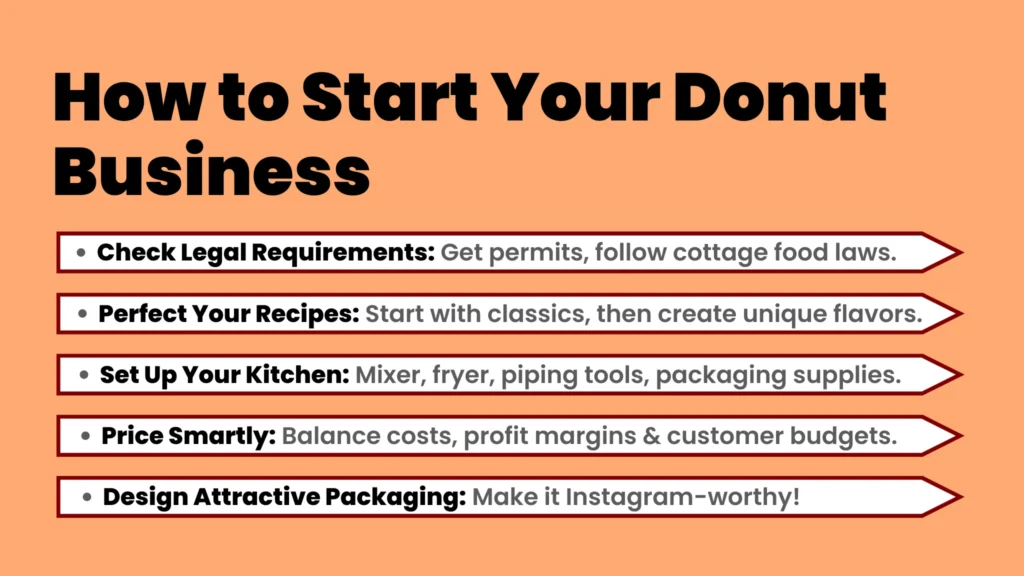How to Start a Home-Based Donut Business: A Complete Guide

If you’ve ever found yourself daydreaming about warm, freshly glazed donuts while sipping your morning coffee, you’re definitely not alone. But here’s the exciting part: what if those daydreams could actually turn into a profitable home-based donut business?
In fact, the popularity of home bakeries has exploded in recent years. From TikTok food trends to Instagram-worthy dessert shots, there’s a growing demand for fresh, handmade, and gourmet donuts. As a result, customers are now willing to pay extra for unique flavors and beautiful presentation.
Even better, starting a donut business from home doesn’t require a massive budget or a fancy storefront. With the right recipes, smart strategies, and creative marketing, you can easily transform your kitchen into a mini donut empire.
In this guide, we’ll walk you through everything you need to know — from setting up your kitchen and perfecting recipes to pricing, packaging, marketing, and scaling your business. So, whether you’re a passionate baker or someone exploring a new side hustle, this step-by-step guide will help you launch confidently and successfully.
Why Starting a Home-Based Donut Business is a Sweet Idea
Starting a home-based donut business is about so much more than just baking; in fact, it’s about transforming your passion into profit while doing something you truly enjoy. Over the past few years, the food industry — especially the artisanal dessert market has experienced tremendous growth.
People today crave fresh, premium-quality, and Instagram-worthy donuts rather than settling for factory-made, mass-produced options you’d find on grocery store shelves.
Because of this shift in consumer demand, starting a donut business from home has become a golden opportunity for aspiring entrepreneurs.
Here’s why now is the perfect time to start:
Firstly, lower startup costs make it accessible.
Unlike opening a traditional bakery, you don’t need to rent an expensive storefront or invest in high-end industrial equipment right away. You can begin small, using your existing kitchen and gradually upgrading as your sales grow.
Secondly, you gain complete work flexibility.
When you run a home-based business, you’re your own boss. You get to set your own schedule, choose how many orders you take, and balance your business around your lifestyle — making it perfect for stay-at-home parents, students, or anyone seeking a side hustle.
Thirdly, there’s a huge demand for customization.
Customers are always looking for personalized, unique donut designs for special occasions like birthdays, weddings, baby showers, and corporate events. By offering custom themes, creative toppings, and packaging, you can stand out in the market and charge premium prices.
Moreover, social media is your best friend.
With platforms like Instagram, TikTok, and Facebook, you can showcase your beautifully decorated donuts, build a following, and attract customers instantly. Just imagine — one viral donut video could bring in hundreds of orders overnight without spending a dime on advertising.
Step 1: Understand the Legal Requirements for Donut Business
Before mixing your first batch, you need to ensure your home-based donut business is legally compliant. Selling food from home comes with specific regulations to ensure quality, hygiene, and customer safety.
Key Steps to Get Started:
Check Cottage Food Laws
In the U.S. and many other countries, home-based food businesses operate under “cottage food laws.” These laws clearly define what foods you can sell, where you can sell them, and whether your kitchen requires an inspection.
Register Your Business
Next, depending on your location, you may need a food license, sales permit, or home bakery registration. Taking this step early helps you avoid unnecessary delays later.
Health & Safety Compliance
Additionally, in some regions, your kitchen may need an inspection to ensure cleanliness, proper hygiene, and safe storage conditions. Meeting these requirements helps build customer trust.
Proper Labeling
Furthermore, if you’re selling packaged donuts, you may need to include ingredient lists, allergen warnings, and expiration dates on your labels. This not only ensures compliance but also makes your products look professional.
Pro Tip: Contact your local small business development center or health department for clear guidance. Starting the right way is always better than dealing with legal issues later.
Your donuts are your brand. To stand out in a competitive market, you need recipes that make people crave more. Taste and presentation go hand-in-hand, so investing time in experimentation pays off.
How to Develop Winning Recipes:
-
Start with the Classics
To begin with, focus on flavors that everyone loves — glazed, chocolate, cinnamon sugar, and Boston cream. These timeless favorites will help you attract your first set of loyal customers.
Get Creative
Once you’ve mastered the basics, it’s time to experiment. After all, unique flavors grab attention and make your brand stand out. Think matcha pistachio, Biscoff caramel, strawberry cheesecake, or even savory cheese donuts for adventurous customers.
Choose Your Donut Style
Next, decide which donut style you want to specialize in:
-
Yeast Donuts – Light, fluffy, and ideal for glazes.
-
Cake Donuts – Dense, crumbly, and perfect for toppings.
-
Mini Donuts – Bite-sized treats that are extremely popular for events and parties.
Focus on Consistency
Equally important, make sure every donut tastes just as good as the last. A single perfect batch isn’t enough; instead, consistency is what builds trust and encourages repeat orders. Therefore, use a digital kitchen scale to maintain precise measurements and achieve flawless results every time.
Test & Improve
In addition, don’t hesitate to test your recipes regularly. Offer free samples to friends and family, then gather honest feedback and make improvements based on their suggestions.
Pro Tip: Keep a recipe journal to record exact measurements, frying times, and techniques. This way, you can replicate results perfectly, even as you expand your menu.
-
Step 3: Set Up Your Home Kitchen for Efficiency
Your kitchen is now your production hub, so you’ll need to optimize it for safety, speed, and consistency. While you don’t need industrial-grade machines to start, a few essentials will make your life easier.
Essential Tools & Equipment:
- Stand Mixer – For smooth and consistent dough preparation.
- Deep Fryer or Heavy-Duty Pan – Ensures perfect frying temperatures.
- Cooling Racks – Keeps donuts crisp and prevents sogginess.
- Piping Bags & Decorating Tools – Ideal for creating customized designs.
- Airtight Containers – Maintain freshness for deliveries and bulk orders.
Pro Tip: Maintain a clean, clutter-free, and food-safety-compliant kitchen. Remember, you’re running a business now not just baking for fun.
Step 4: Price Your Donuts Strategically
Pricing is one of the most important aspects of running a successful donut business. Set prices too low, and you’ll struggle to make a profit. Set them too high, and you risk scaring customers away.
Simple Pricing Formula:
Ingredients + Packaging + Labor + Overheads + Desired Profit = Selling Price
For example:
- Ingredients per donut → $0.60
- Packaging + Labor → $0.40
- Profit Margin → $1.00
- Selling Price = $2.00 per donut
Tips to Boost Sales:
- Offer bundles like “6 donuts for $10” or “12 for $18”.
- Introduce seasonal promos think Valentine’s heart-shaped donuts or Christmas-themed boxes.
- Consider custom orders for weddings, birthdays, and events to command higher prices.
Step 5: Design Eye-Catching Packaging
In today’s social media-driven world, packaging is just as important as taste. People love sharing beautifully presented food online, and good packaging turns your customers into free brand promoters.
Packaging Tips for Donut Business:
- Use branded boxes with your logo.
- Choose eco-friendly packaging to appeal to conscious buyers.
- Include a thank-you note with each order small touches build loyalty.
- Add stickers with your social media handles to encourage tagging and sharing.
Pro Tip: Unboxing videos are a huge trend. Make your packaging Instagram-worthy, and customers will market for you.
Step 6: Market Your Home-Based Donut Business
You could have the world’s best donuts, but if nobody knows about them, you won’t make sales. Thankfully, marketing your home-based donut business is easier than ever.
Top Marketing Strategies for Donut Business:
1. Leverage Social Media
- Post drool-worthy photos and short videos on Instagram, TikTok, and Facebook.
- Use hashtags like #HomemadeDonuts, #SupportLocal, #DonutLovers to reach new audiences.
- Share behind-the-scenes clips customers love watching the process.
2. Partner with Local Influencers
Send free samples to micro-influencers in your area. Their followers can quickly become your first loyal customers.
3. Join Food Communities & Marketplaces
List your products on Facebook Marketplace, local food groups, and community bulletin boards.
4. Offer Seasonal & Custom Orders
Capitalize on holidays, weddings, baby showers, and corporate events custom donut orders can significantly boost profits.
Step 7: Build a Loyal Customer Base for donut business
Long-term success depends on repeat customers. If someone loves your donuts, they’ll not only come back they’ll bring friends.
How to Build Loyalty for your Donut Business:
Offer Discounts to Regular Buyers
To begin with, offer special discounts to repeat buyers to keep them coming back. For example, give 10% off on their third order or provide an exclusive coupon code for their next purchase. This not only rewards loyalty but also encourages more frequent orders.
Launch a “Buy 10, Get 1 Free” Loyalty Program
In addition, create a simple loyalty program to make customers feel valued. Give them a stamp or punch card where every purchase counts. Once they buy 10 donuts, they get 1 free. Alternatively, you can digitize this process using apps or QR codes to make it even easier.
Feature Customer Photos on Social Media
Furthermore, encourage customers to share pictures of your donuts and tag your business. Then, repost their photos on your profile or stories to boost engagement and build trust. This strategy not only creates social proof but also strengthens your online presence.
Collect Testimonials and Display Them Everywhere
Similarly, ask customers for short reviews or testimonials. Afterward, showcase them on your social media profiles, packaging, and flyers. By doing this, you build credibility and attract new buyers who trust the experiences of others.
Step 8: Scale Your Business Over Time: Donut Business
Once you establish a steady flow of orders, it’s time to think about growth. However, the key is to expand strategically, not hastily.
Ways to Scale:
-
Expand Your Menu – Add coffee, milkshakes, or croissants to increase the average order value.
-
Partner with Cafés & Restaurants – Collaborate with local businesses and supply them with your signature donuts.
-
Sell at Farmers’ Markets & Festivals – This is an excellent way to gain exposure and secure bulk orders.
-
Open a Small Shop – Finally, when demand becomes consistently high, consider opening a physical location.
Final Thoughts: Home based donut business
Starting a home-based donut business is undoubtedly one of the most rewarding ways to turn your love for baking into a thriving venture. To begin with, as you take the first steps, perfecting recipes, designing attractive packaging, mastering marketing strategies, and focusing on customer retention all become essential. After all, every single detail plays a crucial role in shaping your long-term success.
Moreover, the beauty of this business lies in its incredible flexibility. Unlike traditional bakeries, you can start small, keep costs low, and gradually expand at your own pace. With consistent effort, dedication, and a spark of creativity, your kitchen could eventually transform into the birthplace of the next viral donut sensation!
Therefore, there’s absolutely no reason to wait any longer — start today. First, test your recipes. Next, finalize your pricing. Then, share your very first donut photo online to attract customers. In the end, remember that the sweetest businesses are built one batch at a time.
Frequently Asked Questions (FAQs): Donut Business
1. How much does it cost to start a home-based donut business?
You can start with as little as $300–$1,500, depending on equipment and packaging. As you grow, you can invest more in branding and marketing.
2. Do I need a license to sell donuts from home?
In many regions, yes. Check your local cottage food laws and health regulations to determine permits, inspections, and labeling requirements.
3. How do I compete with large donut chains?
Focus on what they can’t offer customization, freshness, creativity, and a personal connection with customers.
4. Can I sell donuts online?
Absolutely! Platforms like Instagram, Facebook Marketplace, and TikTok are perfect for showcasing your products and taking pre-orders.
5. How do I get my first customers?
Start with friends, family, and neighbors, then expand through social media, local food groups, and influencer collaborations.
6. What are the best-selling donut flavors?
Classics like glazed, chocolate, and cinnamon sugar always sell, but unique flavors like Biscoff, Oreo cheesecake, and salted caramel can make your brand stand out.










